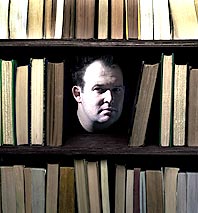
I don’t have a speech to make at all,” says editor Sean McDonald, laughing nervously. He probably should have had one prepared by now. On January 26, McDonald’s best-known author, James Frey, was publicly shamed into confessing on The Oprah Winfrey Show that he had falsified much of his memoir A Million Little Pieces—a book that McDonald had talked up, acquired, and edited when he still worked for the Nan A. Talese imprint of Doubleday. Now, after weeks of declining to speak to reporters, the embattled executive editor of Riverhead Books is calling—with a publicist from Riverhead’s parent company, Penguin Group (USA), closely listening in—to offer his first on-the-record comments.
Until recently, McDonald’s career trajectory appeared inextricably linked to Frey’s: He is the editor who signed up Pieces for $50,000 and spent a year and a half whittling it down from an ungainly manuscript (that ranged from 530 to 800 pages, depending on whether it’s Frey or McDonald telling the story) to the memoir that eventually became an Oprah’s Book Club selection. When McDonald moved to Riverhead in late 2002, he took Frey with him. Last year, he published Frey’s now-disputed follow-up, My Friend Leonard. At the start of 2006, Riverhead announced that it planned to publish two more books by Frey, novels this time, beginning in 2007.
Today, McDonald offers neither explanations nor excuses for his delay in addressing his role in the scandal. “I’ve been learning about all of this the same way as everybody else,” he says. “And it all bewildered me and confused me.”
Though much has been made of the fact that Pieces was originally shown to some publishing houses as a memoir and to others as a novel, McDonald says that he never approached the book as anything other than nonfiction. “I was always working on the understanding that the story was true,” he says. “I did think every fact was accurate, and I never tried to push those facts beyond what was there.” And now? “I can’t deny that my faith in James has been rocked some in the past couple weeks,” he says. “I still think he’s a really talented writer. I think I should leave it at that.”
In a phone interview conducted just days before the Smoking Gun published its exposé of Pieces, Frey was confident that his partnership with McDonald was rock-solid. “I always assumed that at some point Sean would be his generation’s Nan Talese or Sonny Mehta,” the writer had said. “I see myself working with him for as long as I’m writing books. I don’t have any real desire to be anywhere else. I’ll go where he goes.” He clearly also thought of McDonald as a close friend. “I end up talking to Sean almost as much about non-book stuff as I do book stuff,” Frey had said. “Like, ‘Hey, dude, what are you doing on Sunday for the games? Hey, dude, there’s a fight at the Garden on the 7th, you wanna go?’ ”But McDonald declines to say now if he will continue publishing Frey’s books, and will only refer back to Riverhead’s cryptic official statement that “the ground has shifted” and that Frey’s newly announced contract is “under discussion.”
McDonald says he cannot say if the Frey affair will have any long-term effects on his own career, “because I just don’t know.” Many who have worked with McDonald hope it won’t. “That he might be drawn into this cyclone of recrimination that Frey alone is responsible for would be cruelly unfair,” says John Hodgman, whose The Areas of My Expertise was co-edited by McDonald. Literary agent Kassie Evashevski, who represented Frey on Pieces and Leonard but has since terminated her business relationship with the writer, agrees. “[Sean’s] getting raked over the coals because he did a good job publishing those books,” she says.
Others in the publishing industry are less convinced that McDonald is an innocent bystander. “I like Sean,” says Grove/Atlantic publisher Morgan Entrekin. “But he’s the one who’s closest with the author, and he’s the one who should be most skeptical of his claims. Isn’t that what a drug addict is an expert at, lying and dissembling?”
“What I do as an editor is to help people tell their stories,” says McDonald. But he isn’t about to tell his story in its entirety. When asked how it felt to see Talese bearing the brunt of Oprah Winfrey’s televised wrath, McDonald is interrupted by the eavesdropping publicist. “I think that’s a moot question at this point,” says the flack. “I think that’s it.” Next: JT LeRoy’s “Dad” Shops Tell-All